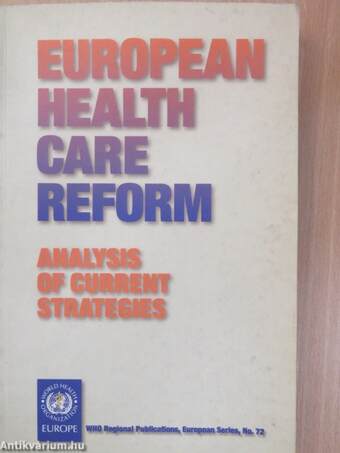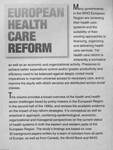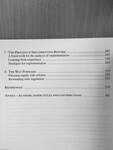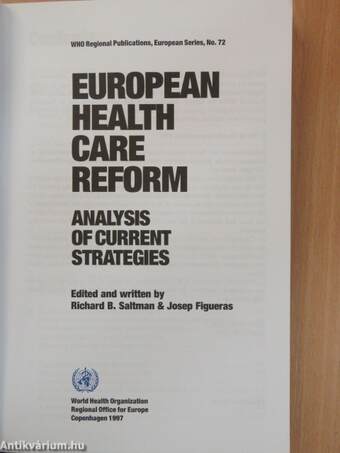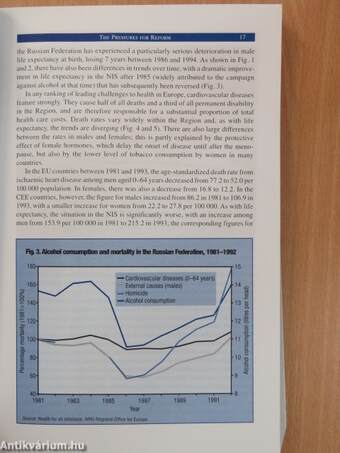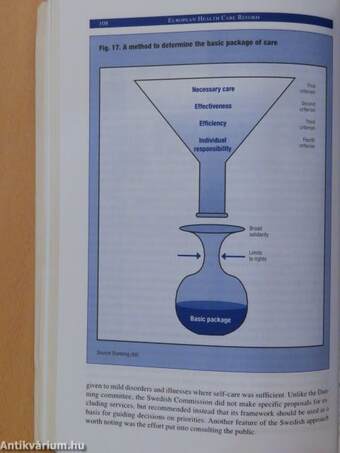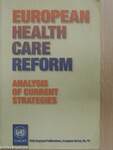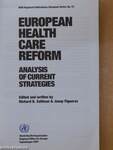1.067.327
kiadvánnyal nyújtjuk Magyarország legnagyobb antikvár könyv-kínálatát

VISSZA
A TETEJÉRE
JAVASLATOKÉszre-
vételek
European Health Care Reform
Analysis of Current Strategies
| Kiadó: | World Health Organization Regional Office for Europe |
|---|---|
| Kiadás helye: | Koppenhága |
| Kiadás éve: | |
| Kötés típusa: | Fűzött papírkötés |
| Oldalszám: | 308 oldal |
| Sorozatcím: | WHO Regional Publications, European Series |
| Kötetszám: | 72 |
| Nyelv: | Angol |
| Méret: | 24 cm x 16 cm |
| ISBN: | 92-890-1336-2 |
| Megjegyzés: | Fekete-fehér ábrákkal. |
naponta értesítjük a beérkező friss
kiadványokról
naponta értesítjük a beérkező friss
kiadványokról
Fülszöveg
M
lany governments
in the WHO European
Region are reviewing
their health care
systems and the
suitability of their
existing approaches to
financing, organizing
and delivering health
care services. Yet
health care reform is
inherently a normative
as well as an economic and organizational activity. Pressures to
achieve better expenditure control and/or greater productivity and
efficiency need to be balanced against deeply rooted moral
imperatives to maintain universal access to necessary care, and to
improve the equity with which services are distributed across social
classes.
CARE
REFORM
T
his volume provides a broad overview of the health and health
sector challenges faced by policy-makers in the European Region
in the second half of the 1990s, and reviews the available evidence
on the impact of key reform strategies. It is conceptual as well as
empirical in approach, combining epidemiological, economic,
organizational and managerial perspectives on... Tovább
Fülszöveg
M
lany governments
in the WHO European
Region are reviewing
their health care
systems and the
suitability of their
existing approaches to
financing, organizing
and delivering health
care services. Yet
health care reform is
inherently a normative
as well as an economic and organizational activity. Pressures to
achieve better expenditure control and/or greater productivity and
efficiency need to be balanced against deeply rooted moral
imperatives to maintain universal access to necessary care, and to
improve the equity with which services are distributed across social
classes.
CARE
REFORM
T
his volume provides a broad overview of the health and health
sector challenges faced by policy-makers in the European Region
in the second half of the 1990s, and reviews the available evidence
on the impact of key reform strategies. It is conceptual as well as
empirical in approach, combining epidemiological, economic,
organizational and managerial perspectives on the current status
of health systems in both the eastern and western parts of the
European Region. The study's findings are based on over
30 background papers written by a team of scholars from all parts
of Europe, as well as from Canada, the World Bank and WHO. Vissza



